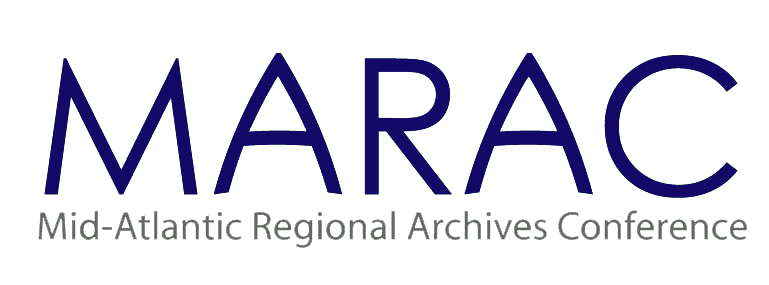Webinars & Workshops
The following formats, Occasional Lecture Series and Workshops, are regularly organized and offered by the MARAC Education Committee. Workshops and other educational programming are offered online via Zoom, in person, and the day before in-person conferences. Other educational proposals are welcome and will be considered – they do not need to fit into the proposed structure. Proposals for new educational offerings are always welcome!
The Education Committee follows the MARAC Privacy and Confidentiality Policy for all communications with instructors and participants.
Upcoming Events
Stay tuned for information about workshops at MARAC's Richmond conference on Thursday, April 30, 2026.
Webinars
45-90 minutes, lecture-based instruction with 10-30 minutes of Q&A
- Share your expertise/experience in an Archival Community of Practice Discussion.
- 45 to 90 min informal discussion and/or presentation with discussion/Q+A (some combination thereof)
- Typically online via zoom in webinar or informal formats
- These events are typically recorded unless otherwise requested. (Q+A is never recorded)
- Any CE points must be sought by the participants individually
- Can also be in the format of a community of practice conversation
Conference Workshops
3 – 6 hours, instruction may include participation such as hands-on activities, discussion, break-out sessions
- In person workshops: Half-day: 3 hours (9:00 -12:00 or 1:00 - 4:00) with one (1) fifteen minute break with light refreshments.
Full-day: 6 hours (9:00 - 4:00) with two (2) fifteen minute breaks with light refreshments and one hour lunch break. Workshops typically take place the day before the conference starts.
- Workshops (with participation) are not recorded.
Off-Conference Workshops
60 minutes – 6 hours, instruction includes participation such as hands-on activities, discussion, break-out sessions (more than a lecture or webinar)
- In person and/or virtual. Off-conference events have more flexibility and will be determined by the venue, instructor, and content. Virtual workshops over 3 hours will typically be split into 2 days.
- Workshops may be recorded; question and answer sections of workshops may be recorded.
Workshops Pricing & Compensation
The standard cost of attending a workshop is between $50 and $100, depending on the length of the workshop. Instructors for workshops are compensated based on current rates. (Please contact us for details.)
Instructor Expectations
Workshop Instructors are expected to meet the Society of American Archivists' Archival Continuing Education (ACE) Guidelines regarding instructor qualifications, delivery methods for adult learning, and areas of archival knowledge.
Wherever possible, resources will be made available to participants (slides, handouts) and to members via the digital repository (DRUM). If you cannot make resources available, please explain why.
Accessibility guidelines - presentation and materials must comply with accepted practice. If you cannot make resources accessible, please explain why.
Workshop Proposals
Please visit our Previous & Upcoming Workshops page for information on accessing or attending workshops. If you are interested in giving a workshop, please submit a proposal on this Google Form. Other educational proposals are welcome and will be considered – they do not need to fit into the described structure.
Last revised May 2025
|
